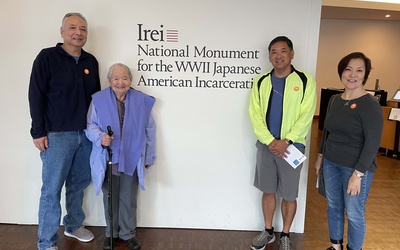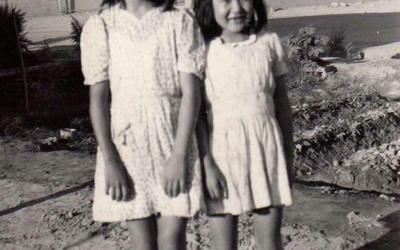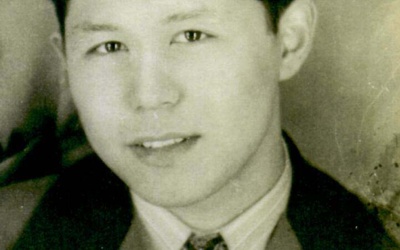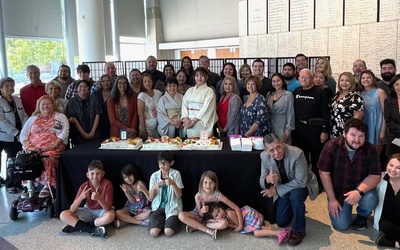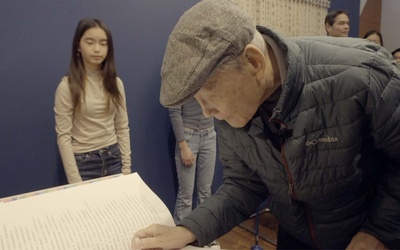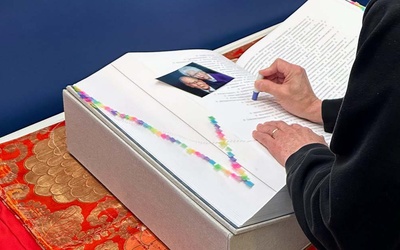O Poder de Irei
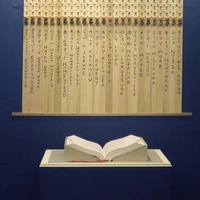
Uma série de artigos relacionados ao Irei: O Monumento Nacional para o Encarceramento Nipo-Americano da Segunda Guerra Mundial , uma instalação de três partes listando os nomes de mais de 120.000 pessoas de ascendência japonesa presas em 75 campos de detenção dos EUA. Esta série homenageará os indivíduos listados entrevistando pessoas pessoalmente ligadas ao encarceramento e oferecerá insights sobre o impacto que este projeto teve em suas vidas.
Stories from this series
O Legado da Resistência: Família Nimura/Kashiwagi em Ireichō
1 de Novembro de 2023 • Sharon Yamato
Sinto que paguei muitas vezes pelo cargo que assumi em Tule Lake. Certamente, você não sai por aí contando às pessoas que passou algum tempo em Tule Lake durante a guerra. Você tenta empurrar isso para algum lugar e não pensa sobre isso. Você tenta bloquear essa parte da sua vida, mas tem que conviver com isso. —Hiroshi Kashiwagi, Natação no Americano Dos aproximadamente 125.000 nomes de ex-detentos listados em Ireichō, mais de 12.000 deles já foram evitados e segregados …
Voltando para casa: a jornada da minha família para Ireichō
15 de Agosto de 2023 • Sharon Yamato
E o que vemos é a nossa vida se movendo assim ao longo das bordas escuras de tudo, faróis varrendo a escuridão, acreditando em mil coisas frágeis e improváveis. Olhando para a tristeza, desacelerando para a felicidade. . . —Mary Oliver, “Voltando para Casa” Foi como voltar para casa quando 17 irmãs, primos, netos e cônjuges, alguns deles vindos de diferentes partes do mundo, se reuniram no dia seguinte a uma grande reunião familiar – desta vez para homenagear membros …
Um homem humilde: 442º veterano Hiroshi Kunimura homenageado em Ireichō
4 de Julho de 2023 • Sharon Yamato
Quando Dennis Kunimura sugeriu a seu pai, Hiroshi Kunimura, ex-artilheiro da 442ª Equipe de Combate Regimental (RCT), de 98 anos, que eles dirigissem de sua casa em Ogden, Utah, para Los Angeles, para marcar os nomes em Ireichō dos membros da família detidos tanto no Centro de Assembléias de Salinas quanto no Campo de Concentração de Poston, o Kunimura mais velho não esperava a recepção esmagadora que o aguardava. Na verdade, quando o soldado idoso foi recebido por uma equipe …
Uma reunião de família milagrosa: os descendentes mestiços de Wasuke Hirota comemoram em Ireichō
17 de Maio de 2023 • Sharon Yamato
O som de vozes alegres e emoções comoventes ecoou pelo Aratani Hall do JANM quando, em 27 de abril de 2023, cerca de 50 familiares de ascendência hispânica, nativa americana e japonesa se reuniram para a celebração do 150º aniversário de seu ancestral Issei, Wasuke Hirota. Adultos e crianças de todas as idades chegaram de lugares próximos como Azusa, Califórnia, e de lugares distantes como Osaka, Japão, para prestar suas homenagens carimbando Ireichō , o livro sagrado no qual o …
Vivendo, morrendo e transmitindo - família Alan Nishio em Ireichō
28 de Março de 2023 • Sharon Yamato
Enquanto os céus de Los Angeles começavam a clarear após a primeira onda de chuva gelada de março, uma reunião familiar de três gerações estava sendo realizada para marcar Ireichō, o livro como monumento aos encarcerados durante a Segunda Guerra Mundial. A convocação da reunião íntima era um rosto familiar na comunidade Nikkei, alguém celebrado pelas suas décadas de liderança altruísta e compromisso com causas como estudos asiático-americanos, reparação e reparações, preservação de Little Tokyo, direitos LGBTQ, empoderamento dos jovens …
Lembrando-os – Família Tsuchiya homenageia os mais velhos por meio de Ireichō
27 de Fevereiro de 2023 • Sharon Yamato
Enquanto vivermos, eles também viverão, pois agora fazem parte de nós, assim como Nós nos lembramos deles. —Sylvan Kamens e Rabino Jack Riemer Estas palavras de dois rabinos judeus foram lembradas por dois irmãos nipo-americanos que decidiram voar de Minneapolis a Los Angeles com o único propósito de marcar os nomes de seus ancestrais em Ireichō, o livro sagrado que lista todos os detidos durante a Segunda Guerra Mundial. . A experiência despertou uma avalanche de memórias para toda a …

